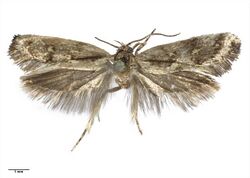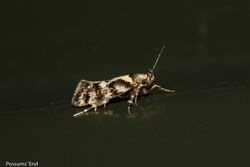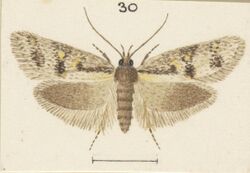Biology:Tingena lassa
| Tingena lassa | |
|---|---|

| |
| Male holotype | |
| Scientific classification | |
| Domain: | Eukaryota |
| Kingdom: | Animalia |
| Phylum: | Arthropoda |
| Class: | Insecta |
| Order: | Lepidoptera |
| Family: | Oecophoridae |
| Genus: | Tingena |
| Species: | T. lassa
|
| Binomial name | |
| Tingena lassa (Philpott, 1930)[1]
| |
| Synonyms[2] | |
| |
Tingena lassa is a species of moth in the family Oecophoridae.[2] It is endemic to New Zealand and has been observed in Otago. It frequents both subalpine habitat at altitudes up to 1100 meters down to sea level residential areas. This species' resting place on rock walls has frequently been spotted. Around November and December, you can see this species' adults flying.
Taxonomy
This species was first described by Alfred Philpott using a specimen collected by Charles Edwin Clarke at Leith in Dunedin in December and named Borkhausenia lassa.[3] In 1939 George Hudson discussed and illustrated this species under the name B. lassa.[4] In 1988 J. S. Dugdale placed this species in the genus Tingena.[2] The male holotype specimen is held at the Auckland War Memorial Museum.[2]
Description
Philpott described this species as follows:
♂. 11 mm. Head and thorax pale brown. Palpi, 2nd segment brown with apex whitish, terminal segment fuscous, with apex whitish ochreous. Antennae ochreous annulated with fuscous, ciliations in ♂ 1. Abdomen purplish grey. Legs ochreous mixed with fuscous, all tarsi banded with fuscous. Forewings with costa hardly arched, apex broadly rounded, termen rounded, oblique; white, densely irrorated with pale fuscous except beneath fold; markings consisting of obscure brown fascia and pale yellow spots; a rather large yellow patch on dorsum at base; a brown stripe along fold connecting with a slightly outwards-curved fascia from costa at 1⁄4 ; a rather prominent yellow spot at junction of these two fasciae and some yellow scales mixed with fascia from costa; a brown fascia from costa at 1⁄2 to tornus enclosing a yellow spot in disc and with some yellow scales at tornus; an obscure brown subterminal fascia containing some yellow scales: fringes brown with some white and yellow scales. Hindwings and fringes fuscous grey.[3]
Distribution
This species is endemic to New Zealand and has been observed in Otago.[1][4][5][6]
Habitat
This species has been observed in both subalpine habitat at altitudes of up to 1100 metres, resting on rock faces, as well as at sea level near a residential stream.[3][5][6]
Behaviour
The adults of this species are on the wing in November and December.[4][5]
References
Wikidata ☰ Q13860076 entry
 |



